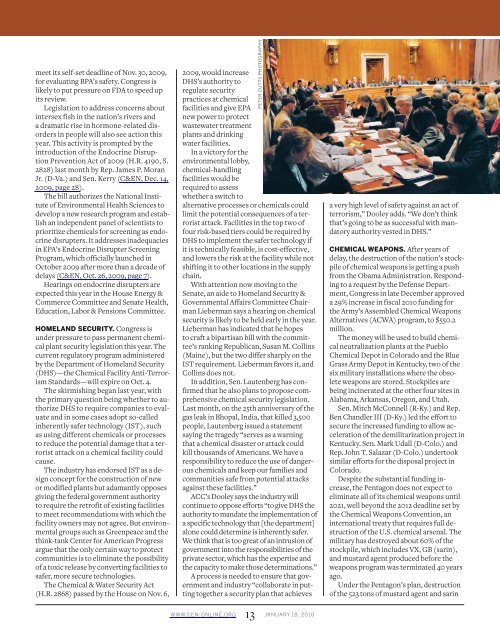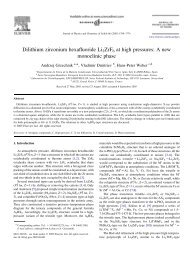Chemical & Engineering News Digital Edition - January 18, 2010
Chemical & Engineering News Digital Edition - January 18, 2010
Chemical & Engineering News Digital Edition - January 18, 2010
Create successful ePaper yourself
Turn your PDF publications into a flip-book with our unique Google optimized e-Paper software.
meet its self-set deadline of Nov. 30, 2009,<br />
for evaluating BPA’s safety. Congress is<br />
likely to put pressure on FDA to speed up<br />
its review.<br />
Legislation to address concerns about<br />
intersex fish in the nation’s rivers and<br />
a dramatic rise in hormone-related disorders<br />
in people will also see action this<br />
year. This activity is prompted by the<br />
introduction of the Endocrine Disruption<br />
Prevention Act of 2009 (H.R. 4190, S.<br />
2828) last month by Rep. James P. Moran<br />
Jr. (D-Va.) and Sen. Kerry (C&EN, Dec. 14,<br />
2009, page 28).<br />
The bill authorizes the National Institute<br />
of Environmental Health Sciences to<br />
develop a new research program and establish<br />
an independent panel of scientists to<br />
prioritize chemicals for screening as endocrine<br />
disrupters. It addresses inadequacies<br />
in EPA’s Endocrine Disrupter Screening<br />
Program, which officially launched in<br />
October 2009 after more than a decade of<br />
delays (C&EN, Oct. 26, 2009, page 7).<br />
Hearings on endocrine disrupters are<br />
expected this year in the House Energy &<br />
Commerce Committee and Senate Health,<br />
Education, Labor & Pensions Committee.<br />
HOMELAND SECURITY. Congress is<br />
under pressure to pass permanent chemical<br />
plant security legislation this year. The<br />
current regulatory program administered<br />
by the Department of Homeland Security<br />
(DHS)—the <strong>Chemical</strong> Facility Anti-Terrorism<br />
Standards—will expire on Oct. 4.<br />
The skirmishing began last year, with<br />
the primary question being whether to authorize<br />
DHS to require companies to evaluate<br />
and in some cases adopt so-called<br />
inherently safer technology (IST), such<br />
as using different chemicals or processes<br />
to reduce the potential damage that a terrorist<br />
attack on a chemical facility could<br />
cause.<br />
The industry has endorsed IST as a design<br />
concept for the construction of new<br />
or modified plants but adamantly opposes<br />
giving the federal government authority<br />
to require the retrofit of existing facilities<br />
to meet recommendations with which the<br />
facility owners may not agree. But environmental<br />
groups such as Greenpeace and the<br />
think-tank Center for American Progress<br />
argue that the only certain way to protect<br />
communities is to eliminate the possibility<br />
of a toxic release by converting facilities to<br />
safer, more secure technologies.<br />
The <strong>Chemical</strong> & Water Security Act<br />
(H.R. 2868) passed by the House on Nov. 6,<br />
PETER CUTTS PHOTOGRAPHY<br />
2009, would increase<br />
DHS’s authority to<br />
regulate security<br />
practices at chemical<br />
facilities and give EPA<br />
new power to protect<br />
wastewater treatment<br />
plants and drinking<br />
water facilities.<br />
In a victory for the<br />
environmental lobby,<br />
chemical-handling<br />
facilities would be<br />
required to assess<br />
whether a switch to<br />
alternative processes or chemicals could<br />
limit the potential consequences of a terrorist<br />
attack. Facilities in the top two of<br />
four risk-based tiers could be required by<br />
DHS to implement the safer technology if<br />
it is technically feasible, is cost-effective,<br />
and lowers the risk at the facility while not<br />
shifting it to other locations in the supply<br />
chain.<br />
With attention now moving to the<br />
Senate, an aide to Homeland Security &<br />
Governmental Affairs Committee Chairman<br />
Lieberman says a hearing on chemical<br />
security is likely to be held early in the year.<br />
Lieberman has indicated that he hopes<br />
to craft a bipartisan bill with the committee’s<br />
ranking Republican, Susan M. Collins<br />
(Maine), but the two differ sharply on the<br />
IST requirement. Lieberman favors it, and<br />
Collins does not.<br />
In addition, Sen. Lautenberg has confirmed<br />
that he also plans to propose comprehensive<br />
chemical security legislation.<br />
Last month, on the 25th anniversary of the<br />
gas leak in Bhopal, India, that killed 3,500<br />
people, Lautenberg issued a statement<br />
saying the tragedy “serves as a warning<br />
that a chemical disaster or attack could<br />
kill thousands of Americans. We have a<br />
responsibility to reduce the use of dangerous<br />
chemicals and keep our families and<br />
communities safe from potential attacks<br />
against these facilities.”<br />
ACC’s Dooley says the industry will<br />
continue to oppose efforts “to give DHS the<br />
authority to mandate the implementation of<br />
a specific technology that [the department]<br />
alone could determine is inherently safer.<br />
We think that is too great of an intrusion of<br />
government into the responsibilities of the<br />
private sector, which has the expertise and<br />
the capacity to make those determinations.”<br />
A process is needed to ensure that government<br />
and industry “collaborate in putting<br />
together a security plan that achieves<br />
WWW.CEN-ONLINE.ORG 13 JANUARY <strong>18</strong>, <strong>2010</strong><br />
a very high level of safety against an act of<br />
terrorism,” Dooley adds. “We don’t think<br />
that’s going to be as successful with mandatory<br />
authority vested in DHS.”<br />
CHEMICAL WEAPONS. After years of<br />
delay, the destruction of the nation’s stockpile<br />
of chemical weapons is getting a push<br />
from the Obama Administration. Responding<br />
to a request by the Defense Department,<br />
Congress in late December approved<br />
a 29% increase in fiscal <strong>2010</strong> funding for<br />
the Army’s Assembled <strong>Chemical</strong> Weapons<br />
Alternatives (ACWA) program, to $550.2<br />
million.<br />
The money will be used to build chemical<br />
neutralization plants at the Pueblo<br />
<strong>Chemical</strong> Depot in Colorado and the Blue<br />
Grass Army Depot in Kentucky, two of the<br />
six military installations where the obsolete<br />
weapons are stored. Stockpiles are<br />
being incinerated at the other four sites in<br />
Alabama, Arkansas, Oregon, and Utah.<br />
Sen. Mitch McConnell (R-Ky.) and Rep.<br />
Ben Chandler III (D-Ky.) led the effort to<br />
secure the increased funding to allow acceleration<br />
of the demilitarization project in<br />
Kentucky. Sen. Mark Udall (D-Colo.) and<br />
Rep. John T. Salazar (D-Colo.) undertook<br />
similar efforts for the disposal project in<br />
Colorado.<br />
Despite the substantial funding increase,<br />
the Pentagon does not expect to<br />
eliminate all of its chemical weapons until<br />
2021, well beyond the 2012 deadline set by<br />
the <strong>Chemical</strong> Weapons Convention, an<br />
international treaty that requires full destruction<br />
of the U.S. chemical arsenal. The<br />
military has destroyed about 60% of the<br />
stockpile, which includes VX, GB (sarin),<br />
and mustard agent produced before the<br />
weapons program was terminated 40 years<br />
ago.<br />
Under the Pentagon’s plan, destruction<br />
of the 523 tons of mustard agent and sarin




